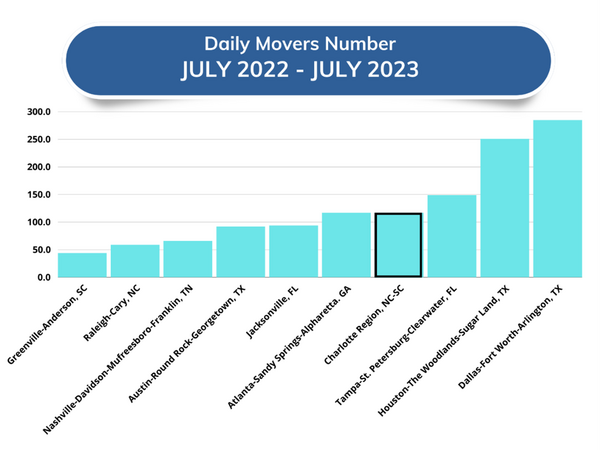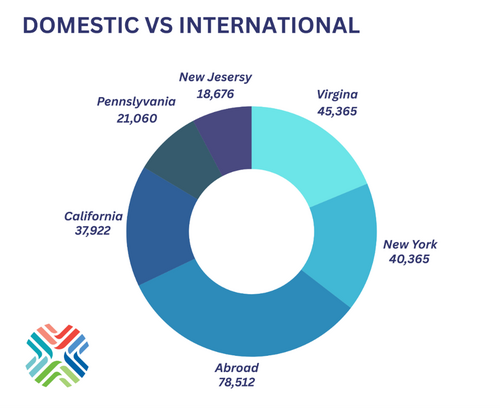The Charlotte Region continues to be a hub of attraction, mirroring or outpacing the growth trends of some of the most dynamic regions in the United States. A Charlotte Regional Business Alliance analysis of recent data indicates a significant influx of new residents, including those with higher educational backgrounds, from various parts of the country and beyond.
Daily migration figures
Charlotte’s appeal as a destination for new residents is highlighted by its daily in-migration numbers. From July 1, 2022 to July 1, 2023, the Charlotte Region1 saw a daily inflow of 117 new residents. That number aligns with Atlanta and surpasses other notable cities such as Austin, Texas; (92 daily movers) and Nashville, Tennessee (67 daily movers). However, it still trails behind the likes of Houston and Dallas, metro areas much larger than the Charlotte Region, which lead with 251 and 285 daily movers, respectively.

Educational newcomers are boosting Charlotte’s workforce
A closer look at the educational qualifications of these new residents reveals a promising trend for the region’s knowledge-based economy. In 2022, the Charlotte area welcomed more than 59,000 people from different countries, states, and counties within the Carolinas, who all earned bachelor’s degrees or higher, bringing the region’s total to more than 687,000 people with bachelor’s degrees or higher. With the influx of highly educated individuals, it not only enriches the local talent pool, but also drives innovation and strengthens the area’s competitive edge in attracting high tech industries and corporate investments.
Interstate and international migration patterns
The broader Carolinas are also experiencing significant interstate and international migration. Virginia tops the list of states feeding into North and South Carolina’s population growth, with 45,365 residents moving in 2022. New York and California follow closely, contributing 40,561 and 37,922 new residents, respectively. Notably, a substantial number of international migrants, 78,512, chose the Carolinas as their new home in 2022. Overall, more than 500,000 people moved to the Carolinas that did not live in either state one year ago. The region’s appeal for its vibrant culture, robust job market, and affordable cost of living make it the perfect place for individuals and families looking for an area that has a balanced and prosperous lifestyle.
Significance of the data
This migration data is not merely numerical, but indicative of the socioeconomic transformations occurring within the Charlotte Region. The inflow of educated individuals bolsters the workforce, enriches the cultural landscape, and drives economic growth through increased demand for services and housing. It also shows the confidence that people have in the region and its ability to be the perfect place to invest their futures and contribute to a thriving community. As Charlotte continues to evolve, it remains a focal point for individuals seeking opportunity and a high quality of life in an increasingly competitive national landscape.
1 The Charlotte Region is known as the following counties: Alexander, Cabarrus, Chester, Chesterfield Catawba, Cleveland, Gaston, Iredell, Lancaster, Lincoln, Mecklenburg, Rowan, Stanly, Union, and York.



